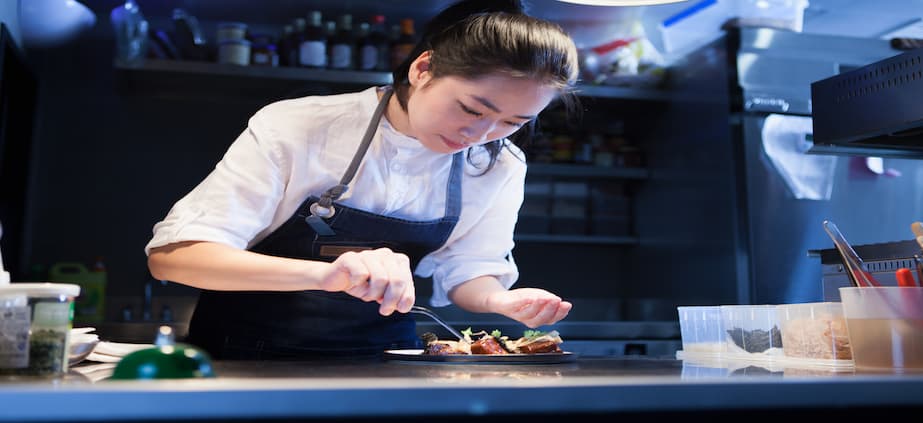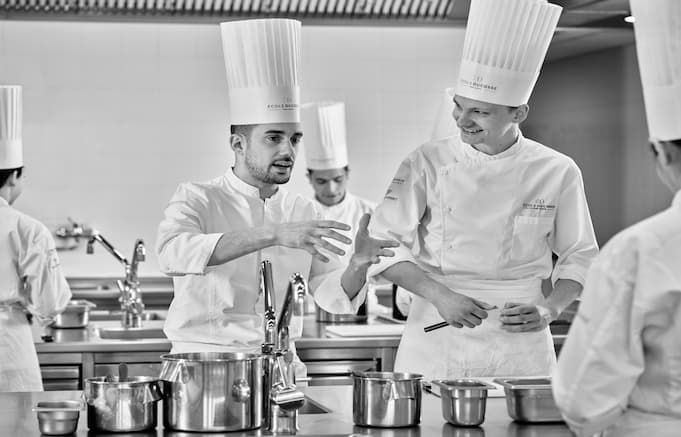What culinary skills do you need to be a professional

Have you ever wondered what it takes to work professionally in a kitchen or restaurant? Do you want to combine your love of cooking with a successful career?
If you aspire to be a professional chef, honing a range of techniques, understanding flavors, nurturing creativity, and embracing a lifelong passion for learning are essential.
This guide will explore these fundamental elements to empower you on your journey towards culinary excellence, whether you aspire to be a head chef or start a restaurant business.
We’ll also talk about how to gain these skills and the different roles you could aim for as a chef.
What are culinary skills?
Culinary skills refer to the ability to prepare and cook food, along with all the associated tasks vital for operating efficiently in a kitchen environment.
These skills aren't restricted to just following a recipe either. They include understanding different cooking methods such as grilling, roasting or sautéing, mastering knife skills, knowing about proper sanitation practices, planning menu items creatively and being adept at kitchen management.
Culinary professionals must also have an astute sense of taste and smell, two fundamental tools when it comes to creating dishes that will delight the palate.
Types of culinary skills
To excel in culinary arts, it's essential to master a broad range of skills. These skills form the building blocks that enable chefs to create delectable dishes daily with innovation and flair.
Let’s look at some of the main areas where you’ll need to build your skills.
Cooking techniques
Mastering multiple techniques is a significant part of honing culinary expertise as sophisticated cooking involves different methods, sometimes simultaneously.
These include boiling, frying, roasting, grilling, sautéing, braising, poaching or stewing. Each method has an approach suited for different ingredients with varied properties.
Find out more about French cooking techniques, which are often considered the classic foundations of refined gastronomy. Knowing how to use different cooking methods effectively can determine culinary success or failure.
Food safety and sanitation
Food safety is a vital part of protecting customers and businesses from illnesses and resulting problems. Food hygiene includes proper storage of ingredients, cooking temperatures, and timely disposal of scraps and expired products.
Excellent sanitation practices, including regular cleaning and personal cleanliness, demonstrate your commitment to a sanitary kitchen and culinary success.
Nutrition knowledge
An astute chef should understand nutrition and the role it plays in good food. Modern diners are health-conscious and interested in nutritional benefits.
A chef must also know about dietary requirements, allergies, and vitamin retention while cooking, as well as how to make healthy dishes that are full of flavor.
Menu planning and design
A well-designed menu balances customer preferences and ingredient availability. It creates harmony between textures and flavors in dishes and different courses.
When devising menus, it’s useful to consider market trends and seasonality. Use creative and appealing wording to describe your food and make customers enthusiastic about ordering it.
Culinary techniques to master
Mastering the techniques of roasting, grilling, frying, and baking forms the backbone of any kitchen professional, enabling them to deliver a range of flavors and textures.
Roasting
Roasting is a basic cooking method that uses indirect heat to brown the surface of food items such as meats and vegetables. Essentially, two things guide successful roasting: temperature control and timing.
Grilling
A technique chefs use to create unique taste profiles by searing food on high-intensity heat. Blending this technique with marinating intensifies food flavors, such as infusing spices into chicken wings. For beginners at the start of their professional journey, mastering grilling demonstrates how to handle high temperatures safely and bring out the flavor of simple ingredients.
Frying
Frying is cooking ingredients over moderate to high heat in a pan coated with oil or containing a shallow layer of fat. Deep frying means immersing the food in a larger volume of oil. When the oil or fat is at the right temperature, frying can give food a satisfying crunch and crispy outer layer.
Baking
A well-rounded culinary repertoire should include baking. It involves scientific precision in heat distribution and chemical reactions between ingredients such as flour and raising agents. In baking, it is essential to have precise measuring tools and follow recipes accurately for making pastry, cakes or bread.
Mise en place
Mise en place is a French culinary term meaning everything in its place and refers to preparing and arranging ingredients and tools before cooking.
Braise
This method makes ingredients flavorful and tender, particularly lower-quality cuts of meat. If your goal is to captivate diners with comfort food that warms them from the inside out, learning to braise efficiently should be on top of your list.
Sauté
Sautéing is the act of tossing food in a shallow pan with minimal oil or fat on medium-high heat until perfectly cooked through or browned.
Marinate
To marinate means placing food in a seasoned blend of ingredients called a marinade before cooking. This enhances the flavor and can also tenderize the food. You will need to learn what characteristics different marinades achieve.
Poach
Lastly, poaching is a gentle cooking method that entails simmering food in liquid just below boiling point to keep its delicate texture intact. It's quite handy, especially for fragile items such as eggs and fish that could otherwise overcook or disintegrate with more vigorous techniques.
Culinary equipment and utensils
Mastering the art of cooking requires more than just a fundamental understanding of ingredients and techniques. You also need to be adept at handling a variety of kitchen tools and equipment. Let's explore these in detail.
Knives and cutting boards
To excel in culinary arts, you will need to familiarize yourself with knives and cutting boards. Knowing how to handle knives is an essential skill if you intend to be a chef. They are essential for dicing vegetables, filleting fish, and slicing meat.
A superior cutting board helps ensure knife longevity and sanitary food handling.
Things you need to know include:
- How to choose different knives for various purposes
- How to select cutting boards
- How to maintain tools
Mixers, blenders, and food processors
If you're new to cooking, mixers, and blenders with multiple speed settings and attachments can save a lot of manual work in preparing complex dishes.
Things to know include:
- When to use a mixer or a blender
- How to check blades for sharpness
- The importance of cleaning equipment after use.
Pots, pans, and other cookware
Pots and pans are essential tools for any chef. It’s also beneficial to understand the various materials used in cookware, such as stainless steel or copper, and which are best suited to different cooking purposes.
The key things to learn include:
- Familiarizing yourself with different types of pots and pans
- Understanding the best materials for specific cooking techniques
- Learning how to care for your pots and pans to enhance durability
Measuring tools
Precision is the key to many successful culinary endeavors, so don't underestimate the power of quality measuring tools. Properly measured ingredients can make all the difference between delicacy and disaster.
Bear these tips in mind:
- Knowledge about measurement tools such as spoons, cups, and digital scales is essential
- Liquid measures are not interchangeable with dry measures
- Tare the scale before using and level off measuring tools
Other skills needed to be a professional chef
If you are looking at landing the highest roles in the food industry, such as head chef or executive chef, you should also focus on building other professional skills. These include management, leadership, and how to work as part of a culinary team.
Kitchen management
Managing a kitchen involves organizing inventory, maintaining equipment, and monitoring expenses while efficiently delegating work to appropriate members of the kitchen staff.
Effective kitchen management requires appropriate stress management and conflict resolution, especially during busy hours or when facing challenges. You’ll also need to gain some business skills, such as revenue management, planning, and record keeping.
Leadership qualities
Being a top-tier chef isn't just about culinary expertise. It also requires stellar leadership qualities, including:
- Delegation skills: appropriate task distribution ensures coherent workflow and promotes optimal productivity
- Communication skills: more than just giving orders, it also means being a willing listener to aid smooth operations
- Problem-solving mindset: a keen eye geared towards pre-empting issues and providing timely solutions prevents workflow issues
- Decision-making: in the fast-paced culinary world, quick and informed decision-making is vital
Teamwork
An effective commercial kitchen needs an atmosphere where collaborative teamwork enhances individual cooking skills. Everyone must understand their role within the team framework – from dishwashers to sous chefs – working towards common gastronomical goals.
How to develop culinary skills
To develop culinary skills, ongoing learning, practice, and proper education are essential. In this section, we will explore strategies to enhance your cooking abilities.
Formal education and training
You can develop the essential cooking skills through formal education and training. Many culinary schools offer respected culinary arts courses where you can acquire fundamental techniques under the supervision of professional chefs.
Culinary classrooms offer students hands-on experience with kitchen equipment, ingredients, and a wide range of preparation methods.
Practice and experience
No amount of theory or classroom teaching alone could ever match practical culinary experience. Becoming skilled in the culinary arts means hours of cooking to perfect techniques for consistent results in an efficient way.
To boost confidence in your culinary skills, you can start with preparing simple dishes at home and gradually transition to more complex creations as you grow in confidence.
Continuous learning
The field of gastronomy constantly evolves and there is new restaurant technology being developed all the time. Maintaining a forward-looking mindset is essential even for the most experienced chef.
Subscribing to online platforms with tutorial videos, blogs or eBooks dedicated to various culinary crafts is a great way to learn more. These can expand your culinary skills by embracing new cuisines and adding their flavors and techniques to your repertoire.
Job opportunities for chefs and cooks
Chefs and cooks have many career options due to the sheer number of establishments around the globe needing their expert culinary abilities. There are many different types of chefs that work in a range of locations, such as:
- Restaurants: upscale restaurants seek highly skilled chefs for creative and delicious dishes
- Bakeries or patisseries: essential cooking techniques for bread-making or confectionery have great value in these businesses
- Food trucks: these cater to those who enjoy cooking beginner-friendly recipes or high-turnover foods in a casual setting
- Corporate kitchens: large corporations have kitchens that need properly trained cooks who understand how to make nutritious meals for large volumes of people
There are also plenty of alternative careers for chefs, where potential employment includes teaching roles within culinary schools, chef consultant roles, or personal chef positions.
Conclusion
The culinary industry is dynamic and ever-evolving, so honing your culinary skills is an elemental part of thriving in this competitive environment. Continuous learning and consistent practice are key components of success.
As in other disciplines, learning the rules means you will have the fundamental cooking techniques to experiment with while still respecting traditional cuisine. It’s important to prioritize food safety, know about nutrition, and possess leadership abilities.
Showcasing your aptitude demonstrates your dedication to professionalism and will support a successful career trajectory in the industry. If you want to get started on the path to becoming a professional chef and learn the skills you need, enroll with Ducasse today.
Photo credits
Main image: Philippe Roy/Royalty-free via getty images



